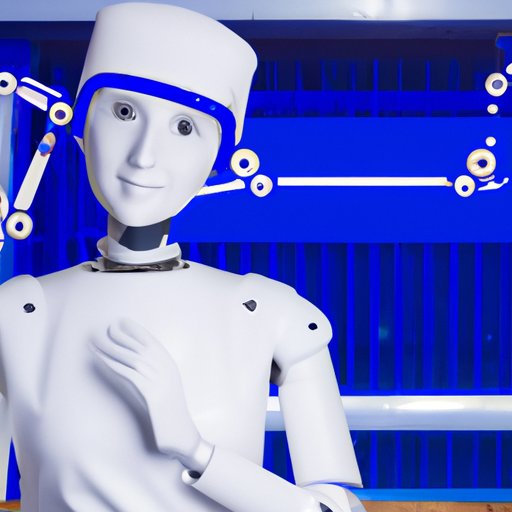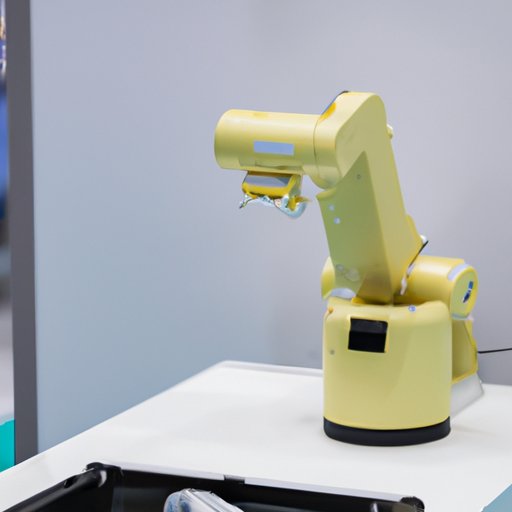Introduction
Robotic engineering is a dynamic and growing field that is revolutionizing the way industries operate. A robotic engineer designs, develops, tests, and maintains robots and robotic systems that can be used to automate processes and tasks. They are tasked with creating robots that can replicate human action with accuracy and precision. As technology advances, robotic engineering has become an integral part of the global economy.
What is a Robotic Engineer?
A robotic engineer is a skilled professional who specializes in the development and maintenance of robots and robotic systems. They are responsible for designing, building, testing, and maintaining robots that can be used in various industries, including manufacturing, healthcare, agriculture, and more. They must have a strong understanding of electronics, mechanics, and computer programming in order to create robots that are able to perform complex tasks autonomously.

The Job Responsibilities of a Robotic Engineer
Robotic engineers work closely with other engineers and technicians to design, build, and test robotic systems. Their job responsibilities include:
- Designing robots that can replicate human actions
- Developing software and programs for robotic systems
- Testing and troubleshooting robotic systems
- Maintaining and repairing robotic systems
- Analyzing data to identify areas for improvement
- Managing projects and ensuring deadlines are met

The Educational Requirements to Become a Robotic Engineer
To become a robotic engineer, you must have a minimum of a bachelor’s degree in engineering or a related field. Many employers prefer candidates with a master’s degree in robotic engineering or a related field. A good academic background in mathematics, physics, and computer science is also essential. Hands-on experience with robotics and programming languages such as Java, C++, and Python is beneficial.
Robotics and the Manufacturing Industry
Robotics is transforming the manufacturing industry by automating processes and tasks that were once done manually. According to a study by McKinsey Global Institute, the adoption of robotics in the manufacturing industry could add up to $1.7 trillion in economic value by 2025. Robots are being used to improve productivity, reduce costs, and increase quality control.

The Role of a Robotic Engineer in Automation
Robotic engineers play an important role in automation. They develop and maintain robotic systems that can be used to automate various processes and tasks. They must ensure that the robots they create are able to accurately and precisely carry out their tasks. They must also be able to troubleshoot any issues that arise and make necessary improvements to the robotic systems.
Working as a Robotic Engineer
Working as a robotic engineer can be both rewarding and challenging. Here are some of the benefits and challenges of working as a robotic engineer.
Benefits of Working as a Robotic Engineer
- You get to work with cutting-edge technology
- You get to be creative and develop innovative solutions
- You get to work on a variety of projects
- You get to collaborate with other professionals from different fields
- You get to help improve the efficiency and productivity of businesses
Challenges of Working as a Robotic Engineer
- It can be difficult to keep up with the rapidly changing technology
- You must be able to think critically and solve complex problems
- You must have strong problem-solving and analytical skills
- You must be able to work under tight deadlines
- You must be able to work independently and as part of a team
Impact of Growing Field of Robotics on Society
The growing field of robotics is having a significant impact on society. Here are some of the positive and negative impacts of robotics on society.
Positive Impacts of Robotics on Society
- Robots can be used to automate mundane and dangerous tasks, freeing up humans to do more interesting and meaningful work
- Robotics can improve efficiency and productivity, resulting in cost savings for businesses
- Robotics can help reduce human error and improve quality control
- Robotics can improve access to healthcare, especially in remote and underserved areas
- Robotics can help reduce environmental impacts, such as air pollution
Negative Impacts of Robotics on Society
- Robotics can cause job losses, as robots can replace humans in certain roles
- Robotics can lead to increased inequality, as those with the skills to use and maintain robots will benefit more than those without these skills
- Robotics can lead to increased surveillance, as robots can be used to monitor people’s activities
- Robotics can be used for malicious purposes, such as cybercrime and warfare
- Robotics can lead to ethical dilemmas, such as when robots are used to make decisions that involve human lives
Conclusion
Robotic engineering is a rapidly growing field that is revolutionizing the way industries operate. Robotic engineers are responsible for designing, building, testing, and maintaining robots that can be used in various industries. They must have a strong understanding of electronics, mechanics, and computer programming in order to create robots that are able to perform complex tasks autonomously. Working as a robotic engineer can be both rewarding and challenging, and the growing field of robotics is having a significant impact on society. We encourage further exploration into the field of robotics to better understand its implications.
(Note: Is this article not meeting your expectations? Do you have knowledge or insights to share? Unlock new opportunities and expand your reach by joining our authors team. Click Registration to join us and share your expertise with our readers.)
